

We’ve been asked by many of our fans for details about our background as well as our legendary celebrity relationships. Suffice it to say that we’ve always just let our music speak for us. There’s really no need to know more than this — we came to your lovely Blue Planet only to spread our own brand of grooviosity to all our brothers and sisters in this universe. And, yes, along the way, we’ve been thrilled to count many of the planet Earth’s most fabulous creatures among our dear friends and fans. So, in honor of the long-awaited re-release of our classic recording of the sixties, The Lounge-O-Leers ’68, we're happy to share some special memories about the times, the thrills and the tunes...
A Shot in the Dark
by Henry Mancini
from the 1964 film "A Shot in the Dark"
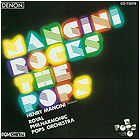
Our earliest musical influences were from film... there's something about sitting in dark room with flickering lights that's just so appealing. And, of course, there’s no one greater in cinematic music than Hank. We first met Hank when we were playing the SouthWest Ballroom Dance Association circuit... as best we can recollect, at a gig at the ‘64 Nevada state finals. Hank was there as a special honoree as the composer of "It Had Better Be Tonight", the biggest hit of the year among the latin ballroom dancers of the great state of Nevada. Imagine our surprise as we finished playing "Moon River Cha Cha" for the Latin semifinals to have Hank, himself, stride up to shake our hands. From that point on, Hank always made sure we got early release copies of all his tunes... and he always dropped in on our gigs whenever we found ourselves in the same city. Hank often commented on our takes on the current pop hits, and said we were largely his inspiration for his '90s recording, Mancini Rocks the Pops, with his orchestral versions of pop/rocks hits from "Thriller" to "Walk Like an Egyptian" to "Material Girl" with the Royal Philharmonic Pops Orchestra. And believe me, no one does a cover of Madonna quite like Hank!
Music to Watch Girls By
by Sidney Ramin and Anthony Velona
recorded by The Bob Crewe Generation - peak chart position #15 (1967)
also charted for Andy Williams - peak chart position #34 (1967)
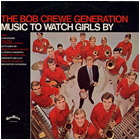
The ultra-dashing Bob Crewe became a great pal early on, often dropping in on us when we played the Howard Johnson’s lounge in his hometown of Newark, NJ. Of course, we were huge fans of his songs, and made sure we played "Let’s Hang On" (and later, "Lady Marmalade") whenever we knew he was in the house. In the fall of 1966, Bob brought in a new tune that he was readying to commit to vinyl as a instrumental, and we knew that it was going to be a big hit for him. We immediately decided to include it in our playlist and were particularly delighted when Bob let us know that there were also super-groovy lyrics! "Music to Watch Girls By" quickly became a favorite of our clientele, and, true to our prediction, became Bob’s first hit as a performer.
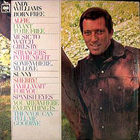
In early ‘67, just as Bob’s instrumental was getting prime airplay, there was increasing interest in us hitting the airwaves ourselves with our vocal version. Well, as it happened, we were playing the Vegas Howard Johnson lounge and Ricky’s gal-pal Claudine Longet (more about her later) brought along her then-husband, Andy Williams. Somehow, within the next three months, Andy released his vocal of the tune, complete with our "la-la" tag chorus! Claudine apologized profusely, Andy got extended airplay when his version was used in a Diet Pepsi TV commercial, and, while we would never assume a connection, arguments between Claudine and Andy escalated and they separated a couple of years later.
The Look of Love
by Burt Bacharach and Hal David
from the 1967 film "Casino Royale"
recorded by Dusty Springfield - peak chart position #22 (1967)
also charted with Sergio Mendes & Brasil ‘66 - peak chart position #4 (1968)
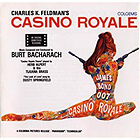
"The Look of Love" is simply THE love song of the century as far as we’re concerned. There’s no ballad that we can think of that captures the spirit of grooviosity in quite the same way...and no songwriters that epitomize that spirit better than our chums, Burt and Hal. Suffice it to say that one of the most memorable nights of our career was a magical evening in ‘69 when Dusty surprised us by dropping in on our gig at the Jackson TN Howard Johnson...and ended up joining us in the evening’s rendition of "The Look of Love". (We were told she insisted on making the hour’s drive from Memphis herself after her session for the day!)
Summer Wine
by Lee Hazlewood
recorded by Nancy Sinatra & Lee Hazlewood - peak chart position #49 (1967)
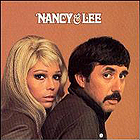
We first met Lee when we were playing the Little Rock, AR Howard Johnson in ‘65...Hot Rod and Lee hit it off immediately. They could spend hours together with nary a word spoken in a cloud of smoke and the clink of glasses. Anyhow, Lee knew of our keen interest in story songs and presented us with this touching tale of a thieving hooker and her comatose john. We were immediately taken with it and added it to our playlist. Sometime shortly thereafter, Lee stopped in to see us at the Omaha Howard Johnson with a mysteriously glamorous soul to let us know he was recording the tuner for a duet album he was working on. Just like magic, the luscious lady was introduced to us as the spectacular Nancy Sinatra and we instantly clicked. After we played our last set, we all hung out till the wee hours... with Lee and Hot Rod in their normal cloud of smoke; and with Nancy and Ricky trading hair-dressing tips.
Magnificent Seven Cha Cha
by Elmer Bernstein
from the 1960 film “The Magnificent Seven”
recorded by Al Caiola and his Orchestra - peak chart position #35 (1961)
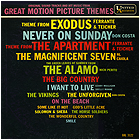
We initially hit the musical scene in the early ‘60s, when we got a gig playing the weekly ballroom dance mixer held in the Oddfellows Hall in lovely Dexter, New Mexico. We quickly found ourselves in great demand, being hired to play ballroom dancing events throughout the southwest...and eventually becoming the band of choice for the Southwest region of The American Ballroom Association. It was during this time that, in conjunction with the Association, we released the first of our recordings, a 45-rpm single featuring this song, backed with our vocal recording of "Sway". Our recording turned into an instant hit and came to attention of Howard Brennan Johnson, himself a keen ballroom dancer, who hired us to play in the lounges at his huge Howard Johnson empire and the rest is, as they say, history.
Red Rubber Ball
by Paul Simon and Bruce Woodley
recorded by The Cyrkle - peak chart position #2 (1966)
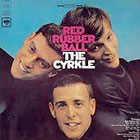
We admired this song from the first time we heard The Cyrkle’s recording...and we started singing our version of this tune almost immediately. One night when we were playing the Allentown, PA Howard Johnson lounge, a sweet, young lady came up to us after our set to tell us how much she enjoyed it. The next night she showed up again, with two strapping lads in tow, who were introduced to us as Don and Tom of The Cyrkle. Well, one thing led to another and before we knew it, they were joined by Paul and Art (The Cyrkle had opened for Simon & Garfunkle on tour), followed by Bruce Woodley (then performing with The Seekers) and finally by Brian Epstein, who was managing The Cyrkle. Well, as you can imagine, a swell night was had by all.
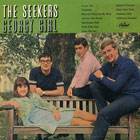
Over the years, our ties with our folk-rock brethren have continued...we stayed friends with Don and Tom (Mr. "Plop, Plop, Fizz, Fizz" to you) throughout their jingle-writing careers; S&G’s "Mrs. Robinson" continues to be one of our most-requested numbers; we quickly picked up on The Seekers’ hit of late ‘66, "Georgy Girl", and made it our own...and as for Brian, dear darling Brian, he hung with us anytime he was with 100 miles of where we were playing (which was not often enough) and it was Brian who, within the first week of our meeting, introduced us to John (who, in proper "cyrk-uitous" fashion, is the bloke who came up with the name – and spelling – for The Cyrkle) because he was certain we’d be great "mates", and, well, that’s a whole other story...
The Fool on the Hill
by John Lennon and Paul McCartney
originally recorded by The Beatles on the 1967 LP, "Magical Mystery Tour"
charted with Sergio Mendes & Brasil ‘66 - peak chart position #6 (1968)
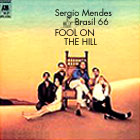
Upon meeting John, we quickly realized we were kindred spirits and he became one of our biggest supporters. John often sent us advance copies of tunes he felt we needed to know about (not only from The Beatles, but also from his other "mates"). It was at dear Brian’s memorial service at St. John’s Woods in the summer of ‘67 that finally saw John again as we all lamented our mutual loss. We all promised to get together for a proper night out soon, and we knew somewhere out there, Brian must be pleased that connection he had established would continue to flourish. Within the next month, we received an advance tape of the songs planned for Magical Mystery Tour. We were immediately drawn to "Fool on the Hill"...and the ultra-hip song soon entered our playlist in our latin-flavored version. In February ‘68, the ultimate hipster himself, Herb Alpert (an old friend and fan since our early covers of the TJB), dropped in on us in Phoenix with Sergio Mendes and Lani Hall (later to become Mrs. Herb), and they were all immediately struck by our take on the Lennon-McCartney tune. At the set break, we were cornered by the three of them and they asked if we would object if a Brasil ‘66 version of "Fool" was included in their next album. Of course, we were delighted... and were equally delighted when the recording took off on the pop charts!
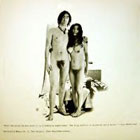
As for our relationship with John, he happened to catch up with us in Cincinnati later in the spring of ‘68, with an exquisite, exotic creature on his arm. They hung for the entire evening and, as was always par for the course whenever we shared John’s (and from that moment on, Yoko’s) company, we carried on until dawn broke, breaking all seven deadly sins and creating an extra three of our own. Then in mid-May, during a break from our set in the Kalamazoo Howard Johnson lounge, we received a trans-Atlantic call from John and Yoko from their home studio in Kenwood (how they tracked us down, we’ll never know). Yoko, in particular, wanted desperately to know what number we had assigned to our new sin of "complete irreverence to authority". "John, it’s number 9...number 9" is all we heard as they hung up. Five months later, we received an advance copy of Two Virgins...ah, those wacky kids!
Young Girl
by Jerry Fuller
as recorded by Gary Puckett & the Union Gap - peak chart position #2 (1968)
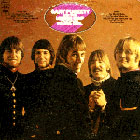
Never ones to pass up a good story song, we were big fans of the songs Jerry Fuller was writing for Gary Puckett and The Union Gap from the first time we heard their earliest hit, "Woman, Woman". No, we never crossed paths with either the songwriter or the dapper Mr. Puckett (our loss, we’re certain). But, we’re also certain that there is absolutely no story song out there that can compare with this torrid tale about the dilemma facing an upstanding gent-of-the-world in the face of an underage vixen. A damn fine hook, and socially relevant to boot! Just the way a story song should be. Bravo, boys!
Sukiyaki
by Rokusuke Ei and Hachidai Nakamura
recorded by Kyu Sakamoto - three weeks at #1 (1963)
also charted with A Taste of Honey - peak chart position #3 (1981)
also charted with 4 P.M. - peak chart position #8 (1994)
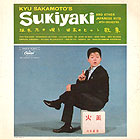
We’ve played this tune all the way back to our ballroom dancing days...initially as a fox trot, following first hearing it in Kenny Ball and his Jazzmen’s version in early ‘63. It was always a favorite of ours, and we were delighted when, later that same year, the original, Japanese-language, vocal version was released and became a huge chart hit. We continued playing "Sukiyaki" throughout the ballroom dance circuit for the next three years... and, of course, as we started playing the Howard Johnson circuit in ‘64. It was during the first night of a two-week stint in the summer of ‘65 at the Seattle Howard Johnson lounge that we first noticed an impish man lingering at the bar through the entire evening. He re-appeared every night for the next several days, and by the fifth night, we sent a cocktail to him with our compliments. At our break, we went over and discovered that the gentleman in question was none other than Kyu Sakamoto. Unfortunately, his English was almost as elementary as our Japanese, but somehow we were able to make ourselves understood. Needless to say, Kyu was particularly curious as to why we did an instrumental of the tune rather than a vocal... and once he understood the only problem was in learning the foreign lyrics, he spent the next day helping Hot Rod master them. That night, we premiered our new, groovier "Sukiyaki", complete with the original Japanese lyrics. Kyu was a dear, dear man who remained a close friend (his English got progressively better; our Japanese stayed about the same) until his untimely death in 1985. As a side note, it was after A Taste of Honey’s Janice-Marie Johnson heard us perform "Sukiyaki" in Newark in 1980 that she was inspired to write her English-language translation of the lyrics Kyu had taught Hot Rod all those years ago.
Watermelon Man
by Herbie Hancock and Gloria Lynne
instrumental recorded by Mongo Santamaria - peak chart position #10 (1963)
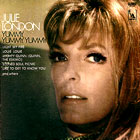
We had been playing this ultra-hip tuner as an instrumental since we first heard it on Herbie’s album in ‘62. In the spring of ‘65, our dear friend (and fanatical supporter), the fab jazz musician Bobby Troup dropped in on us at the San Francisco Howard Johnson lounge with his wife, the stunning Miss Julie London. A huge fan of Julie’s since we first heard her, we were, of course, thrilled to meet her...and doubly thrilled when she asked to join us at the mike as soon as we started playing "Watermelon Man". Now, normally, we never, ever play for another singer, but, for God’s sake, it was, after all, THE Julie London. Julie had just started planning her new album — which turned out to be the splendid Feeling Good — and had just acquired lyrics to the tuner (written by the equally stunning vocalist Gloria Lynne) which she shared with us. So, from that moment on, "Watermelon Man" became a favorite vocal number for us in tribute to the glorious Miss London... and we played it for her whenever she was in our presence. Julie and Bobby frequently dropped in on us and we all became great pals. Julie always talked about how much she admired the fact that we kept in touch with current pop hits and in ‘69, she payed us the ultimate compliment when she sent us an advance copy of her latest album, Yummy, Yummy, Yummy with the following note: "with much love and admiration from your biggest fan...I only hope I’ve been able to serve up these pop hits with as much relish as you boys always manage. Kisses, Julie." And, boy, did she ever!
One Mint Julep
by Rudolph Toombs
recorded by Ray Charles - peak chart position #8 (1961)
Quite simply, our fave instrumental piece...instantly indicative of the hip and ginchy era that was the ‘60s. What more need we say?
Call Me
by Tony Hatch
recorded by Chris Montez - peak chart position #22 (1966)
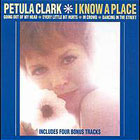
One of Hot Rod’s fave singers of all time is Petula Clark, one of his fave composers of all time is Tony Hatch, and one of his fave albums of all time is their disk, I Know a Place... so it only seems natural that "Call Me" is a song we have performed consistently since discovering it on Pet’s album in ‘65. We still adore Pet and Tony, we still perform "Call Me" (as well as a number of other songs associated with Pet and/or Tony) and we still can’t believe our good fortune in being among the first to recognize the brilliance of this tune — which, over the years. has been recorded by so many of our fans and friends who claim our version inspired them...including Sinatra (both Nancy and her dad), Ella, Shirley Bassey, Sarah Vaughan, Astrud Gilberto, Nancy Wilson, Lulu and many, many, many more.
Sway
by Norman Gimbel and Pablo Beltran Ruiz
recorded by Bobby Rydell - peak chart position #14 (1960)
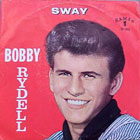
In 1960, we were just starting to understanding what was to become our future in the ballroom dancing universe. We would spend hours in record store listening booths previewing the newest 45s, looking for additions to our growing repertoire. It was at that time that Ricky ran across the fresh-faced Bobby Rydell (guess we were pretty fresh-faced then, too...) on the picture sleeve of his recording of the latin dance perennial, "Sway". Now, we really didn’t need the single, as we were already playing our version of "Sway", but Ricky insisted we purchase it — without even giving it a go in the listening booth. When we got it to our phonograph, we were delighted to discover Bobby’s super-swinging version. Of course, we had to maintain our more traditional dance version to play at our ballroom gigs (and, in fact, this recording was the "B" side of our 45m "Magnificent 7 Cha Cha", co-issued by the SW Ballroom Association)...but Ricky’s chance decision to purchase the single was instrumental in shaping our future sound. For this 45 provided not only the inspiration of Bobby’s hit, cooler than cool take on "Sway", but also the super-ginchy "B" side, "Groovy Tonight", which, as far as we’re concerned, really moved us squarely into the swinging sixties!
Un Homme et une Femme
by Pierre Barouh and Francis Lai
from the 1966 film "Un Homme et une Femme"
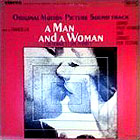
This classic cinematic tune came to us via Ricky’s old pal, Claudine Longet. Ricky had met her during his brief stint performing with the Follies Bergere in Vegas (Lawdy, don’t ask), where Claudine was the lead dancer...and they had become fast friends. It was the summer of ‘66, a hot, humid summer (at least at the New Orleans Howard Johnson lounge where we were holding court for the season). Claudine had slipped away from Andy for a little weekend holiday somewhere where (in her words), "she would feel not quite so foreign". Anyhow, Claudine was very homesick and we spent the weekend doing "Frenchy" things...the food was delish, but we have to admit that while it was nice to get out of the heat into an air-conditioned movie theater, the film Un Homme et une Femme was a bit of a snoozer.
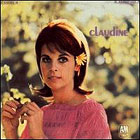
BUT, there was that splendid song! We added it to our playlist the next night (with Claudine’s help on the pronunciation). That night, our chum Herb Alpert stopped in, greatly admired our version of the tune and said it was just the sort of thing he was looking for to broadening the primarily latin-tinged music currently in his A&M Records catalog. We were greatly flattered and Herb joined Claudine and us at our table for further discussions. As luck would have it, Herb had recently seen Claudine singing a song called "Meditation" on the NBC-TV series Run for Your Life and was clearly smitten. Claudine was signed by Herb’s A&M Records, and the following spring, Claudine recorded her version of "Un Homme et une Femme" for her first album... the first of five albums she recorded for the label. Well, c’est la vie...
Love American Style
by Charles Fox and Arnold Margolin
from the ABC-TV series "Love American Style"
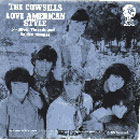
Charlie Fox was among our earliest fans and a huge inspiration for us. You see, we learned a lot of what we know about life, love and the human condition from the magic box that is television...and there’s nobody who writes a better TV theme song than Charlie. Not only this fab tune, but also Happy Days, Laverne & Shirley AND the apex of all TV themes, The Love Boat. No slouch in cinema music either, Charlie also penned the scores for the ultra groovy Barbarella, Goodbye Columbus...and, of course, the likes of "Killing Me Softly" and other pop classics. Anyhow, Charlie brought us this tune right before the holiday season of 1968 and asked if we might consider recording the end title for a new TV show. Well, it just happened that Claudine Longet (natch) dropped by with her friend Barbara Cowsill (we always wondered exactly what that relationship really was...) and we introduced them to Charlie and went back to finish the set. Before we knew it, the show’s exec producer and the song’s co-writer, Arnie Margolin joined them...and, well, you might guess the rest. We recorded our version; the suits at ABC wanted a bigger "name"; The Cowsills, fresh off their hit recording of "Hair" recorded their version of OUR version; and the show went on the air with The Cowsills. Well...in the second season, The Cowsills’ take on the theme song was replaced by a version recorded by The Charles Fox Singers and within the next eighteen months, The Cowsills stopped playing together as a band. Ricky remained friends with Claudine (we NEVER found out the story with Claudine and Barbara) until she not only followed our suggestion to record "Bang Bang, My Baby Shot Me Down", but also made it come true in real life by shooting the spectacular Spider dead...and had to withdraw her recording at the demand of the Sabich family. At that point, we thought it would be better for all of us if our paths never crossed again.
Tijuana Taxi
by Ervan Coleman
recorded by Herb Alpert & The Tijuana Brass - peak chart position #38 (1966)
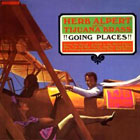
Our relationship with Herb goes all the way back to our ballroom dancing days. Several of the TJB’s early hits were among our mainstay tunes for latin competitions, including "The Lonely Bull" (which we later began performing as a vocal when Pet Clark shared her French lyrics for the tune with us). In 1964 at the Nevada state finals (where three years earlier we first met Hank Mancini) Herb and the TJB were being honored for their "Mexican Shuffle" (which had became a sensation once Clark Gum co-opted it as "The Teaberry Shuffle")...and it was there that our mutual admiration society began.
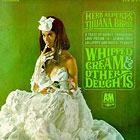
We’ve always counted on Herb to hunt out the grooviest new tunes (including this swell song); and Herb claims it was our rather fanciful selection of cover songs that inspired him in many of his repertoire choices. At any rate, we’ve had more than our share of truly memorable nights with Herb, including his birthday party in ‘65 when, as a joke, we stuck a Barbie doll in his birthday cake up to her waist and smeared frosting to cover her, well...upper torso. Imagine our surprise the next month when the new TJB album, Whipped Cream and Other Delights, was released with a live version of our birthday cake tribute on the cover!
Sunshine Superman
by Donovan Leitch
recorded by Donovan - One week at #1 (1966)
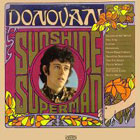
"Sunshine Superman" was among the first of the tunes John Lennon sent our way after our initial meeting in early ‘66. John said he knew that his "mate", Donovan, would (in his words) "really dig" our take on the new sounds of the swingin’ sixties. We were completely entranced by the new psychedelic sound, and immediately added it to our playlist. Well, in the spring of ‘66, Donovan was playing some dates in the states and John sent him our way when we were playing the Pasadena Howard Johnson lounge. We were immediately taken by his warm, gentle spirit and he was delighted to hear our version of "Sunshine Superman", particularly as his recording was, at that point, still unreleased. Interestingly, due to a legal dispute, Donovan’s recording of "Sunshine Superman" wasn’t released until July of ‘66...so for several months, our version was the tune’s sole exposure. However, we did have to admit to Donovan that while we loved the song, we really couldn’t make heads nor tails of the evocative lyrics. As we closed our final set, Donovan invited us to join him at a party he was heading to...and said that it would really be the best way for him to help us understand the song. Well, it was certainly the most atmospheric party we’ve ever attended, with a curious snack menu of sugar cubes, mushrooms and some sort of herb cigarettes. The next afternoon, we found ourselves back at our suite in Pasadena...not really sure how we got there, but finding that, miraculously, Donovan was right. We did understand every word in the song (although, like Donovan, we really couldn’t figure out a way to explain them to anyone else).
Secret Agent Man
by Steve Barri and P. F. Sloan
from the CBS-TV series "Secret Agent"
recorded by Johnny Rivers - peak chart position #3 (1966)
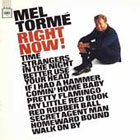
For us, this song is inextricably tied to Mel. We’ve been fortunate enough to be able to call Mel a fan (and great friend) from the first time he stopped in to hear us at the Oak Park, IL Howard Johnson in ‘65 at the recommendation of Nancy’s father, Frank. Of course, we were great admirers of Mel’s artistry, particularly his hipper than hip ‘62 hit "Coming Home Baby" (inexplicably, his only chart hit). When we initially met, Mel was in the midst of his Columbia Records years, and was actively seeking the swinging-est of the new chart hits to fulfill Columbia’s request that he record contemporary pop/rock songs rather than his more traditional American Songbook repertoire. Needless to say, we shared song selections and on his pop album for Columbia, Right Now!, Mel recorded many songs that were on our regular playlist, including "My Little Red Book", "Red Rubber Ball" and this tune. There’s probably no song more evocative of the sixties than this very hip TV theme song. Squarely rooted in the psyche of the era, the romantic image of the suave, seriously cool spy had universal appeal...and no one bought the image more than Hot Rod; no one, that is, except maybe Mel. Like Hot Rod, Mel was fairly obsessed with spies and he and Hot Rod literally spent hours on "spy talk"...so, it seemed like a natural fit when "Secret Agent Man" became a particular fave tune for us all. We played it whenever Mel walked into the room, and he always shot us a knowing glance whenever we did. So, you can only image our delight when Mel told us he was recording his version of the TV tuner...and how flattered we were when we first heard it, complete with the end tag we had been performing to finish out the tune, which Mel told us was his special tribute to us (at that point, just the "only got a number, Secret Agent Man" line). Of course, Mel being Mel, he made the tag even groovier by extending the song’s ride-out ("they’ve taken way your name...he is a spy, Secret Agent Man") and from that point on, we’ve always performed Mel’s extended tag as our tribute to the grooviest singer that we’ve ever had the pleasure of knowing, Mr. Mel Torme.